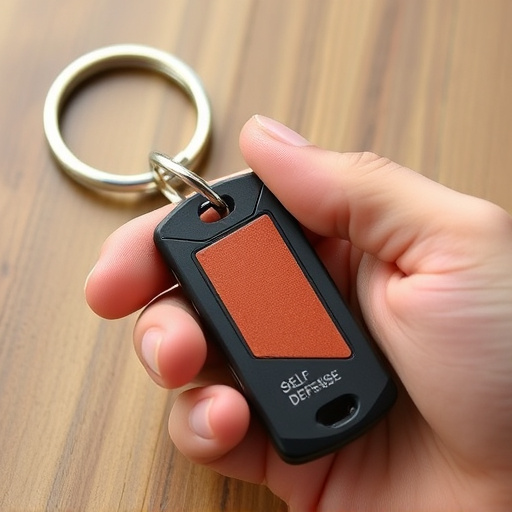Self-defense keychains are legal in some US states, like Texas and Florida, but heavily regulated or prohibited in others, such as California and New York. Understanding each state's unique rules is crucial for responsible self-defense. These laws cover "personal protection devices" with variations in "stand your ground" and de-escalation policies. When choosing a keychain, ensure it meets industry standards, has reliable mechanisms, and complies with local regulations, balancing effectiveness and legal considerations.
“Unveiling the power of self-defense at your fingertips, this article explores the world of covert protection keychains. With their discreet design, these keychains offer a unique approach to personal safety. We delve into the legalities surrounding self-defense keychain use across the US, examining state-specific regulations and their impact on accessibility. From understanding hidden mechanisms to making informed purchases, this comprehensive guide empowers users to navigate Self Defense Keychain Laws by State effectively, ensuring both legality and peace of mind.”
- Understanding Self-Defense Keychain Legalities Across the US
- Disguised Design: The Evolution of Covert Protection Keychains
- State-Specific Regulations: A Comprehensive Overview
- Choosing the Right Self-Defense Tool: Considerations for Purchase and Legal Compliance
Understanding Self-Defense Keychain Legalities Across the US
Across the United States, laws regarding self-defense keychains vary significantly from state to state. It’s crucial for anyone considering carrying a keychain designed for self-defense to understand these legalities before making a purchase. Some states, like Texas and Florida, allow citizens to carry certain types of self-defense tools, including keychains with built-in weapons, without a permit. These laws often categorize such devices as “personal protection devices” or “self-defense tools,” setting clear guidelines on what’s permissible.
In contrast, other states have stricter regulations. California, for instance, has stringent rules regarding self-defense weapons, and while some keychains might be legal for personal use, any device with a blade or designed to cause lethal injury is typically prohibited. States like New York also have specific laws covering the carriage of knives or similar instruments, making it essential for individuals to research their state’s particular regulations to ensure compliance. Understanding Self-Defense Keychain Laws by State is therefore paramount for responsible and legal self-defense.
Disguised Design: The Evolution of Covert Protection Keychains
The evolution of covert protection keychains reflects a growing demand for personal safety and the unique challenges faced in diverse environments. These keychains, designed to look like everyday accessories, have emerged as a discreet self-defense solution. Their disguised nature allows users to carry a potential weapon legally, adhering to varying Self Defense Keychain Laws by State. This subtle approach to self-protection is gaining traction among individuals seeking an extra layer of security without drawing unnecessary attention.
The market now offers a wide array of options, from simple metal keychains with hidden blades to more complex models featuring non-lethal stun devices or pepper spray. This evolution not only caters to diverse preferences but also ensures users can choose a device that aligns with their state’s legal requirements. As self-defense becomes an increasingly personal matter, the disguised keychain concept provides a practical and legally acceptable solution for those seeking peace of mind in an unpredictable world.
State-Specific Regulations: A Comprehensive Overview
In the United States, the laws surrounding self-defense keychains vary significantly from state to state. Understanding these regulations is crucial for anyone considering carrying a disguised self-defense tool. Some states, like Texas and Florida, have relatively relaxed laws allowing for the open or concealed carry of certain types of self-defense tools, including keychains designed with protective capabilities. These states often prioritize individual freedoms and right-to-carry policies.
In contrast, other states have stringent regulations that may restrict or prohibit the possession of any self-defense device, disguised or not. California, for instance, has some of the most strict weapon laws in the country, which often include broad definitions of what constitutes a “weapon.” States like New York and Illinois also have comprehensive regulations that classify and regulate self-defense tools, including keychains, based on factors such as blade length, weight, and potential as a lethal weapon. When navigating Self Defense Keychain Laws by State, it’s essential to consult local legal resources for the most accurate and up-to-date information.
Choosing the Right Self-Defense Tool: Considerations for Purchase and Legal Compliance
Choosing the right self-defense tool, like a keychain, involves careful consideration to ensure effectiveness and legal compliance. In the US, self-defense laws vary significantly by state, so understanding local regulations is crucial before making a purchase. For example, some states have “stand your ground” laws that allow for the use of force without retreating, while others require you to attempt de-escalation first. Additionally, specific restrictions on the types and size of self-defense devices are common; checking state and local guidelines is essential to avoid legal issues.
When shopping for a self-defense keychain, look for products that meet industry standards for quality and safety. Ensure they are designed with reliable mechanisms and effective force delivery systems, without exceeding legal limits. Researching different models and reading customer reviews can help identify options that best suit your needs and comply with Self-Defense Keychain Laws by State.
In conclusion, the evolution of disguised protection keychains has introduced innovative self-defense options while navigating complex legalities across different states in the US. Understanding the specific regulations regarding self-defense keychains is essential for those seeking to empower themselves with this portable tool. By considering state-specific laws and making informed choices, individuals can ensure they remain within legal boundaries while enhancing their personal safety. When equipped with knowledge about Self Defense Keychain Laws by State, responsible citizens can protect themselves effectively and responsibly.
